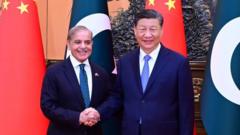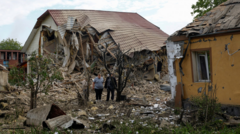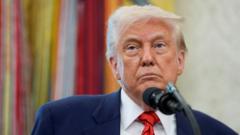Following the announcement of new tariffs by President Trump, Wall Street faced its largest decline since the beginning of the pandemic. Global leaders from Europe and Asia swiftly condemned the measures, pledging counteractions that are likely to further escalate international trade tensions.
Global Market Turmoil Following Trump's Tariff Implementation

Global Market Turmoil Following Trump's Tariff Implementation
U.S. stock markets experience a dramatic downturn as President Trump enacts a series of tariffs, prompting global backlash and economic uncertainty.
U.S. stock markets experienced a significant plunge after President Donald Trump initiated a major wave of tariffs on U.S. imports, marking one of the steepest declines on Wall Street since the early pandemic era. The S&P 500 fell 4.8 percent, attributed to a shock from the aggressive tariffs which included a 20 percent tax on European Union goods and a staggering 34 percent tariff imposed on China.
International repercussions were immediate, with European leaders, including Ursula von der Leyen, president of the European Commission, organizing a unified response against the U.S. tariffs, emphasizing solidarity with the phrase, "If you take on one of us, you take on all of us." China responded with strong rhetoric, indicating that it would take necessary measures to protect its interests.
In Canada, Prime Minister Mark Carney announced a retaliatory 25 percent tariff on automotive imports from the U.S., while Mexico’s President Claudia Sheinbaum highlighted a strategy to boost domestic industries to mitigate potential fallout. French President Emmanuel Macron further escalated tensions, urging European firms to halt investments in the U.S. until clearer terms can be established.
The market reaction reverberated across Asia and Europe, leading to broad declines in stock indices, raising concerns about a potential trade war that could have lasting impacts on the global economy. Major tech companies like Apple bore the brunt of the sell-off, dropping nearly 9 percent amid growing uncertainty. The prospect of economic isolationism and retaliatory tariffs looms heavily, challenging global trade dynamics and prompting calls for a reassessment of international economic policies.





















